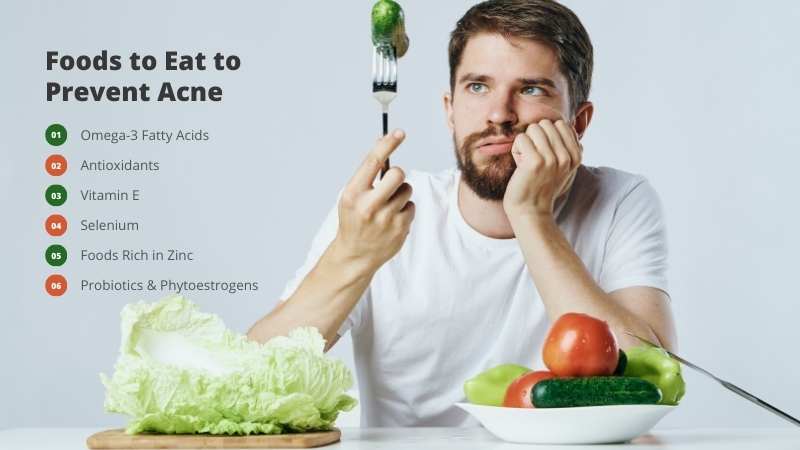“Acne-Fighting Diet: Foods to Eat and Avoid for Clearer Skin
Related Articles on Acne-Fighting Diet: Foods to Eat and Avoid for Clearer Skin
- Effective Treatments for Back Acne: A Comprehensive Guide
- A Comprehensive Guide To Clearing Hormonal Acne Without Medication
- How To Treat Pustular Acne Without Leaving Scars On Your Skin
- Salicylic Acid Vs. Retinol: Which Works Best For Acne Treatment?
- Salicylic Acid Vs. Retinol: Which Works Best For Acne Treatment?
Introduction
With enthusiasm, let’s delve into the fascinating topic related to Acne-Fighting Diet: Foods to Eat and Avoid for Clearer Skin. Let’s weave together interesting information and provide new perspectives for our readers.
Table of Content
Video on Acne-Fighting Diet: Foods to Eat and Avoid for Clearer Skin
Acne-Fighting Diet: Foods to Eat and Avoid for Clearer Skin

Acne is a common skin condition that affects millions of people worldwide. It is characterized by the occurrence of pimples, blackheads, and whiteheads on the skin, particularly on the face, chest, and back. While there are various treatments available for acne, including topical creams, oral antibiotics, and hormonal therapies, a well-balanced diet can also play a significant role in preventing and managing acne. In this article, we will discuss the foods that can help fight acne and those that should be avoided for clearer skin.
Understanding Acne
Before we dive into the diet aspect of acne, it is essential to understand the causes of this skin condition. Acne occurs when the pores on the skin become clogged with dead skin cells, oil, and bacteria. This can lead to inflammation, redness, and the formation of acne lesions. There are several factors that can contribute to the development of acne, including:
- Hormonal changes: Fluctuations in hormone levels, particularly during puberty, menstruation, pregnancy, and menopause, can lead to increased oil production and acne.
- Genetics: Family history can play a role in the development of acne.
- Stress: High levels of stress can increase the production of hormones, such as cortisol, which can contribute to acne.
- Poor skin care: Not washing the skin regularly, using harsh products, and picking or popping pimples can lead to acne.
Foods that Help Fight Acne

While there is no single "acne-fighting" food, a diet rich in whole, nutrient-dense foods can help promote healthy skin and reduce the occurrence of acne. Here are some foods that can help fight acne:
- Berries: Berries are rich in antioxidants, particularly vitamin C and ellagic acid, which can help reduce inflammation and protect the skin from damage.
- Leafy Greens: Leafy greens, such as spinach, kale, and collard greens, are rich in antioxidants and fiber, which can help promote healthy digestion and reduce inflammation.
- Fatty Fish: Fatty fish, such as salmon, tuna, and mackerel, are rich in omega-3 fatty acids, which can help reduce inflammation and promote healthy skin.
- Sweet Potatoes: Sweet potatoes are rich in vitamin A, an essential nutrient for healthy skin, hair, and nails.
- Avocados: Avocados are rich in healthy fats, fiber, and antioxidants, which can help promote healthy digestion and reduce inflammation.
- Nuts and Seeds: Nuts and seeds, such as almonds, walnuts, and chia seeds, are rich in healthy fats, protein, and fiber, which can help promote healthy digestion and reduce inflammation.
- Whole Grains: Whole grains, such as brown rice, quinoa, and whole-wheat bread, are rich in fiber, vitamins, and minerals, which can help promote healthy digestion and reduce inflammation.


Foods to Avoid for Clearer Skin
While some foods can help fight acne, others can exacerbate the condition. Here are some foods that should be avoided or consumed in moderation:
- Dairy Products: Dairy products, particularly milk and cheese, contain hormones and natural growth factors that can stimulate oil production and lead to acne.
- Refined Sugars: Refined sugars, such as those found in candy, cakes, and cookies, can cause inflammation and lead to acne.
- Processed Meats: Processed meats, such as hot dogs, sausages, and bacon, are high in sodium, preservatives, and saturated fats, which can lead to inflammation and acne.
- Fried Foods: Fried foods, such as french fries, fried chicken, and doughnuts, are high in calories, saturated fats, and sodium, which can lead to inflammation and acne.
- Soy Products: Soy products, particularly those that are highly processed, can contain phytoestrogens, which can stimulate oil production and lead to acne.
- Gluten: Gluten, a protein found in wheat, barley, and rye, can cause inflammation and lead to acne in some individuals.
Tips for Incorporating Acne-Fighting Foods into Your Diet
Incorporating acne-fighting foods into your diet can be easy and delicious. Here are some tips:
- Start with small changes: Begin by incorporating one or two acne-fighting foods into your diet each week.
- Eat a variety of foods: Aim to include a variety of foods from each food group to ensure you are getting a range of nutrients.
- Cook at home: Cooking at home allows you to control the ingredients and portion sizes of your meals.
- Drink plenty of water: Staying hydrated is essential for healthy skin, so aim to drink at least eight glasses of water per day.
- Consider keeping a food diary: Keeping a food diary can help you identify any foods that may be triggering your acne.
FAQ
Q: Will eating certain foods guarantee clear skin?
A: While a well-balanced diet can help promote healthy skin, it is not a guarantee of clear skin. Acne is a complex condition, and other factors, such as genetics, stress, and skin care, can also play a role.
Q: Can I still eat foods that are high in sugar and dairy if I have acne?
A: While it is not necessary to completely eliminate foods that are high in sugar and dairy, it is recommended to consume them in moderation. These foods can exacerbate acne, so it is best to limit your intake.
Q: How long will it take to see results from an acne-fighting diet?
A: The amount of time it takes to see results from an acne-fighting diet can vary depending on individual factors, such as the severity of acne and overall health. Some people may see improvements in as little as a few weeks, while others may take several months.
Q: Can I take supplements to help fight acne?
A: While supplements, such as vitamin D and omega-3 fatty acids, may be beneficial for overall health, they should not be relied upon as the sole treatment for acne. A well-balanced diet and healthy lifestyle should always be the first line of defense.
Conclusion
Acne is a common skin condition that can be frustrating to treat. While there are various treatments available, a well-balanced diet can play a significant role in preventing and managing acne. By incorporating foods that are rich in antioxidants, fiber, and healthy fats, and avoiding foods that are high in sugar, dairy, and processed ingredients, you can help promote healthy skin and reduce the occurrence of acne. Remember, everyone’s skin is different, and what works for one person may not work for another. Be patient, and don’t be afraid to try new foods and lifestyle changes to find what works best for you. With a little patience and persistence, you can achieve clearer, healthier skin.

Conclusion
Thus, we hope this article has provided valuable insights into Acne-Fighting Diet: Foods to Eat and Avoid for Clearer Skin. We appreciate the time you took to read this article. See you in our next article!
